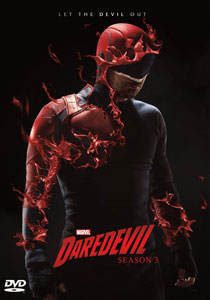There’s something to be said about keeping good villains around, and “Daredevil” Season 3 (October 2018, Netflix) is a case in point. Although Wilson Fisk (Vincent D’Onofrio) was the Big Bad of Season 1, he again fits that bill here, in 13 episodes that explore how one ingenious sociopath can take control of the very systems – the FBI, the justice department – that should theoretically protect society from him.
Fisk the manipulator
There’s one fuzzy part to Season 3, executive produced by Erik Oleson, with Drew Goddard stepping back to a consultant role. At first, the theme seems to be Fisk’s frustrations with being in prison, unable to guarantee the safety of his beloved Vanessa (Ayelet Zurer). Later, it’s about his stunning level of control over everything, with an incredibly deep roster of associates and killers. That transition is too abrupt for my taste.
While I’m slightly suspicious that the writing team changed their minds midway, Oleson and his team do give us two juicy examples of Fisk manipulating FBI agents from which we can then extrapolate to explain his massive cadre of allies.

“Daredevil” Season 3 (2018)
Netflix, 13 episodes
Creator: Drew Goddard
Stars: Charlie Cox, Vincent D’Onofrio, Deborah Ann Woll
Agent Nadeem (Jay Ali) is a textbook example of a good FBI man, and we see the step-by-step process by which Fisk gets even him under his thumb via a frame-job and threats against his wife and son. And Agent Poindexter (Wilson Bethel) is a sociopath like Fisk, so Fisk plays on their commonalities, incredibly beginning to work on him while he’s under Poindexter’s watch.
D’Onofrio continues to act the hell out of this role, and if he’s not the most entertaining and engrossing villain of the MCU then I’m spacing on a truly amazing bad guy. By this point in the series, the actor is benefitting from what’s established about Fisk: If you’re in his tight inner circle – as Vanessa is, and as Poindexter hopes to be – you’re safe. If you’re not, you’re merely an asset, and one that he’ll immediately eliminate (often with his bare hands) if that’s the right move in his overall power games.
This knowledge on the part of the viewer gives extra tension to scenes that wouldn’t otherwise have it, like when he’s trying to encourage a woman to sell him back his beloved “Rabbit in a Snowstorm” painting in episode 11. Will he kill her with his bare hands? Or will he respect her decision and amicably leave her home? The line between those two options is defined, but we know how tenuous it is. It makes every Fisk scene deliciously intense.
Daredevil’s inner conflict continues
Oh, and by the way, Matt Murdock/Daredevil (Charlie Cox) is also in the third season of “Daredevil,” having – SPOILER ALERT – survived the conclusion of “The Defenders.” At the start of “Daredevil,” I scoffed on the inside about how Matt believes so strongly in not killing bad guys, thinking “Well, surely you can make an exception for someone like Fisk.”

But the show continues to lean into Matt’s conflict here, accentuated by his secret living quarters in the basement of the Catholic church, and I don’t find it cheesy anymore. (Besides, if you want the catharsis – and fallout – of going on a killing spree of people who deserve it, there are two seasons of “The Punisher” for you.)
Season 3 also bobs and weaves into the story of Karen (Deborah Ann Woll, who I sometimes think is the best actor on this talent-packed series), which is more tragic than I would’ve guessed, and gives Foggy (Eldon Henson) some great moments as a hero within the suit-and-tie, law-and-politics crowd that Matt doesn’t trust anymore.
Even with Goddard stepping back and other big-name writers from previous seasons gone, “Daredevil” remains the class of the MCU, regardless of screen size. While its Netflix run is over, I gotta think there’s a good chance it will return someday on Disney’s streaming service. It’s too good, and too well-liked.
Here are my rankings of the 13 episodes of Season 3, along with notes on the showcase fight sequences. It’s a season that drastically improves in the back half, as you can see from my rankings:
1. “Upstairs/Downstairs” (episode 8, written Dara Resnik)
This acting smorgasbord features memorable turns by Bethel as the jittery Poindexter attempting to reconcile with his beloved Julie (Holly Cinnamon), and Woll as the shaky-but-brave Karen going toe-to-toe with Fisk. We can see Karen’s fear is just barely contained in this verbal showdown backed by an ominous score, but Fisk isn’t going to be outsmarted in episode 8, so it morphs into another example of how he’s always one step ahead.
Not only does he resist attacking Karen on camera, he also gets her to reveal Daredevil’s identity. Foggy, running for state district attorney, gets a standout moment as he challenges his opponent on the issue of prosecuting Fisk. This loaded episode is capped by the out-of-nowhere surprise that Sister Maggie (Joanne Whalley) is Matt’s mother; I hadn’t even considered the identity of Matt’s mother to be a narrative point.
2. “Revelations” (9, Erik Oleson and Sam Ernst)
This is the definitive Kingpin episode even though Fisk doesn’t have many scenes. When the group of corrupted FBI agents gathers around a table, we hear Fisk called “Kingpin” for the first time; these “Hey, that’s from the comic!” moments are often cheesy, but here it’s chilling. Having seen his manipulation of Poindexter and the frame-job on Nadeem – carried out by his boss, long ago under Fisk’s thumb – the fact that Kingpin has pulled off this coup is believable.
The backstory of Maggie, Matt’s mother, is very much a Catholic guilt yarn, as she abandons him to become a nun, believing that is the right thing to do in God’s eyes. While I can’t relate to that mode of thinking, her story certainly fits with the overarching theme of “Daredevil.”
3. “One Last Shot” (12, Ernst)
This is the “We tried it your way” episode, as Matt agrees to Foggy’s plan to pin down Kingpin using the justice system. While it doesn’t work – Fisk threatens the families of the entire grand jury in the latest “How the heck did he pull that off?” moment – it’s still gripping to watch the good guys give it a shot.
When Dex delivers the “Rabbit in a Snowstorm” painting with a bloodstain on its frame, it nicely ties into the fear we felt for the owner back when Fisk talked to her in episode 11. A more overt creepy moment finds Vanessa, now fully let into Fisk’s enterprise, giving the order to have Nadeem killed.
The fight: The shootout among stopped traffic en route to the courthouse for Nadeem’s deposition lets us marvel at both Daredevil’s skills and the endless depth of Fisk’s resources.
4. “Karen” (10, Tamara Becher-Wilkinson)
Flashback episodes where actors in their 30s are asked to play recent high school graduates are always awkward, especially since the MCU TV shows don’t use the expensive de-aging effects like the films. That said, Woll shows off her acting chops as we learn why Karen’s relationship with her father is strained: She used to be a drug dealer and she got her brother killed in a DUI.
While I wish Karen’s activities were more tightly tied into bailing out her dad’s failing restaurant, Woll sells everything well, and this backstory does explain her bravery in going after Fisk in episode 8.
The fight: In a refreshing switch from hallway fights, Daredevil and Dex mix it up among pews of the church, which looks amazing with its candle-lit red hues. And here’s a neat touch: Karen speaks quietly of her plan to Matt during the fight, knowing he can hear her but Dex can’t.
5. “A New Napkin” (13, Oleson)
Matt tried it Foggy’s way in episode 12, and now he does it his way. There’s nothing hugely surprising in the finale, but I like the twist that Vanessa’s ordering of Nadeem’s murder is Matt’s leverage against Fisk: He won’t go after Vanessa if Fisk goes to prison. It’s deliciously satisfying that Nadeem strikes a key blow against Fisk from beyond the grave, having recorded a message outlining all of Fisk’s crimes.
The fight: Daredevil, of course, strikes the literal blows as he goes mano a mano against Fisk in the crime lord’s posh suite, a reprise of their alley fight in Season 1. Poindexter (more overtly defined as Bullseye in the final shot, perhaps setting him up as Season 4’s Big Bad) is also in the mix, fighting both Fisk and Daredevil; it’s a bit maddening that he’s still fighting Daredevil, but on the other hand, his madness has been well established by this point.
6. “Reunion” (11, Jim Dunn and Resnik)
It’s great to see Matt, Foggy and Karen together again, discussing their final push against Fisk; since this is “Daredevil,” the discussion happens on a rooftop in a rundown part of Hell’s Kitchen, and I wouldn’t have it any other way. This episode would sound rote on paper: Fisk tries to buy back the painting, Nadeem tries to find an angle to do right in a sea of wrong, and Dex tries to find a way to kill Karen in a sea of witnesses.
What makes it work is that we’re immersed in every moment, knowing the painting owner is walking a fine line that she herself might not be aware of, rooting hard for Nadeem to find a way, and relishing that Dex can’t get the job done. We’ve seen Fisk’s power, but “Reunion” allows us a shred of hope, and it’s a welcome shred.
7. “The Perfect Game” (5, Tonya Kong)
We take an extreme detour, but a good one, into the origin story of Dex. The orphan’s extreme OCD that manifests as a need for perfection, combined with his anger, leads to him killing his baseball coach. That’s a standard tragic-villain backstory, but what makes Dex more interesting is his ongoing struggle to land the girl he loves, Julie – something that’s especially hard for him given his condition.
Julian Holmes directs the hour with a minimalist theater approach with “Fisk” watching from the sidelines. In a more overt example of Fisk’s swath of influence, he tells the FBI that Matt Murdock is his fixer, thus explaining why he hired him for a case way back in Season 1. Despite having the least amount of Daredevil of any episode, this is a good one.
8. “Blindsided” (4, Lewaa Nasserdeen)
Matt’s prison visit nets him a small piece of information about the rivalry between the Albanians and Fisk, but the length he goes to get that info is what makes this hour memorable.
The fight: The episode’s centerpiece, and the best action sequence of the season, is a 15-minute stretch in the locked-down prison with Matt caught in the middle. It starts as a classic hallway fight and keeps building in intensity with alarms and flashing lights.
Director Alex Garcia Lopez probably didn’t literally shoot this all in one take – there are probably some cleverly concealed edits in there – but it’s still an amazing piece of filmmaking, and the first sign of the season that “Daredevil” has its groove back.
9. “The Devil You Know” (6, Dylan Gallagher)
Here we see Fisk expertly get Dex to his side by playing on his need to have a reliable person in his life; this parallels nicely with Matt’s need. So while this episode doesn’t keep a viewer off-balance, it is a strong down-the-middle character piece. At the same time, the bigger mystery is building up. Nadeem now knows he’s being played, and I’m totally invested in this pivotal character who it seems will sway the course of the season.
The fight: Daredevil faces the faux Daredevil (Dex) in the New York Bulletin offices, with the latter’s crazy-accurate ricochet skills on full display for the first time. I know he’ll become known as Bullseye, but the name “Ricochet” would fit too.
10. “Aftermath” (7, Sarah Streicher)
“Daredevil” rarely feels as comic-booky as during this revelation: Fisk has a hotel-basement lair right under the FBI’s noses, and he now has artwork all over the walls of his safehouse suite. The source material is a comic, so it’d be silly to complain too much, but I do wish the seeds of Fisk’s wide net of influence were planted earlier.
The fight: In one of the more emotionally wrenching fights of the season, Daredevil battles Melvin (Matt Gerald), the simpleminded but good-hearted outfitter who is (like most people) under Fisk’s thumb.
11. “Please” (2, Dunn)
It’s strange that Matt is now out and about but he hasn’t informed Karen or Foggy (whose family, which runs Nelson’s Meats, we meet for the first time) that he’s back from the dead.
The fight: We see a criminals-versus-FBI shootout from the perspective of Fisk, who is trapped in an overturned bulletproof van, only to be rescued by an FBI gunman who doesn’t miss. We’ll later learn this is Dex.
12. “Resurrection” (1, Oleson)
Season 3 gets off to a slow start as Matt is at his lowest point, lacking his “sonar” sense as he recovers from having a building fall on him in “The Defenders.” While Sister Maggie is an immediately compelling presence as Matt’s new voice of Catholic conscience – supplementing Father Lantom (Peter McRobbie) – this is a confusing episode.
Why do Karen and Foggy (shown in flashbacks) seem to hate that Matt is Daredevil? Shouldn’t they think it’s kind of cool? And the sudden shift to Nadeem’s story made me wonder if a whole ’nother show mistakenly started on Netflix.
The fight: Matt participates in a boxing match in the bowels of the church to work his way into fighting shape.
13. “No Good Deed” (3, Sonay Hoffman)
The season is still finding its footing, as it leans heavily into Matt’s obsession with Fisk and what he believes is his imminent escape from FBI custody. He’s haunted by Fisk talking in his ear, a conceit for this hour only. It’s strange that people protest outside the cushy hotel where Fisk is being held by the feds, as in the real world the public doesn’t care about such details. (On the other hand, public perception is a tool in Fisk’s arsenal, so I understand why the public’s POV is being established.)
As Matt decides to be “The Devil” full time, he essentially breaks up with Foggy; it’s one of those clichéd superhero things that never lasts. The episode’s standout revelation is that Dex’s supposed girlfriend is actually someone he is stalking.

